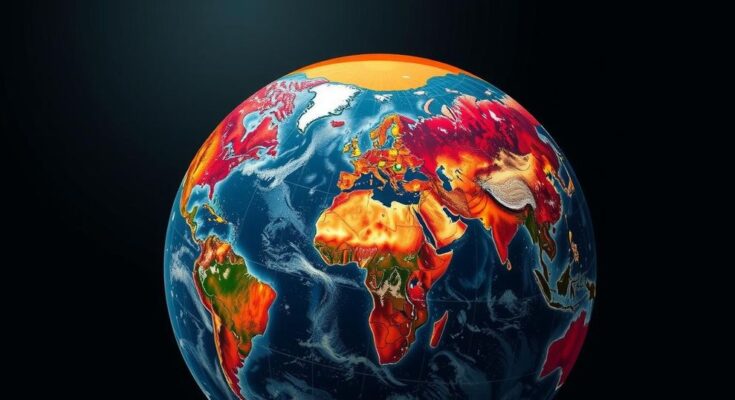The “10 New Insights in Climate Science” report emphasizes the urgent need for enhanced climate action as global temperatures reach alarming highs. Key findings indicate significant disruptions to ecosystems and human habitation due to extreme weather, fueled by emissions. The report calls for drastic reductions in emissions, accelerated energy transition, and improved resilience in infrastructure, underscoring the importance of fair and inclusive climate policies.
The recent report titled “10 New Insights in Climate Science,” released by Future Earth, The Earth League, and the World Climate Research Programme, underscores the urgent existential threat posed by global warming. Compiled with insights from 80 researchers across 45 countries, the report reveals alarming data about rising global temperatures and extreme weather patterns, indicating that humanity is significantly off-course in meeting the Paris Agreement’s target of limiting warming to 1.5 degrees Celsius. In 2023, the global average temperature stood at 1.45 degrees Celsius above pre-industrial levels, with record high sea temperatures recorded for 14 consecutive months prior to May 2024. The Global Stocktake (GST) from COP28 concluded that, to mitigate climate change impacts, there is an imperative need to double the improvement in energy efficiency and ripple renewable energy capacity by 2030. To respect both the Paris Agreement and the COP21 targets, a staggering reduction in global emissions is necessary—28% more than projected for 2030 to remain within a 2 degrees Celsius limit, and a 42% reduction to meet the 1.5 degrees Celsius threshold. The report elaborates on several climate-related phenomena exacerbated by human activities, notably the significant rise in atmospheric methane levels, which, due to its potency, accelerates warming. Conversely, while aerosol levels decline—beneficial for air quality—they historically contribute to a temporary cooling effect, thus complicating short-term climate predictions. Currently, hundreds of millions face uninhabitable climate conditions, predominantly in lower-income and tropical regions, where population growth continues to heighten vulnerability to extreme weather, impacting health outcomes and threatening livelihoods. According to the fifth insight, intensified El Niño events could lead to economic costs reaching trillions by century’s end due to climate impacts on ecosystems and infrastructure. Given the alarming trends, the report strongly advocates for increased climate financing aimed at bolstering infrastructure resilience while emphasizing that restoring ecosystems, particularly biodiverse regions like the Amazon rainforest, should take precedence over reactive adaptations to climate shifts. Furthermore, urban centers must implement more effective greenhouse gas emission reduction strategies as they contribute disproportionately to the climate crisis. As clean energy transitions progress, the importance of managing supply chains for energy transition minerals and overhauling governmental policies to facilitate these changes becomes paramount. The report stresses that the perception of policy fairness will significantly influence public acceptance and participation, underscoring the need for equitable climate action to foster broad-based support.
The ongoing climate crisis necessitates urgent action to mitigate its severe impacts worldwide. With global temperatures rising at unprecedented rates, there exists an array of consequences including extreme weather, biodiversity loss, and economic disruptions. This situation is compounded by ongoing emissions from human activities, prompting calls for comprehensive international policy frameworks aimed at reducing emissions and fostering sustainable practices. The latest report from Future Earth and its partners serves as a crucial focal point for understanding recent scientific insights and formulating responses to safeguard both human and environmental well-being.
The findings presented in the “10 New Insights in Climate Science” report serve as a clarion call to global leaders and policymakers to reassess current strategies and adopt more aggressive measures to combat climate change. Addressing the alarming rise in global temperatures and its cascading effects on ecosystems, human health, and economies is imperative. Through greater commitment to renewable energy, reductions in methane emissions, and equitable climate policies, there is potential to effect meaningful change. This report not only highlights the challenges we face but also provides a roadmap for necessary actions moving forward.
Original Source: impakter.com




